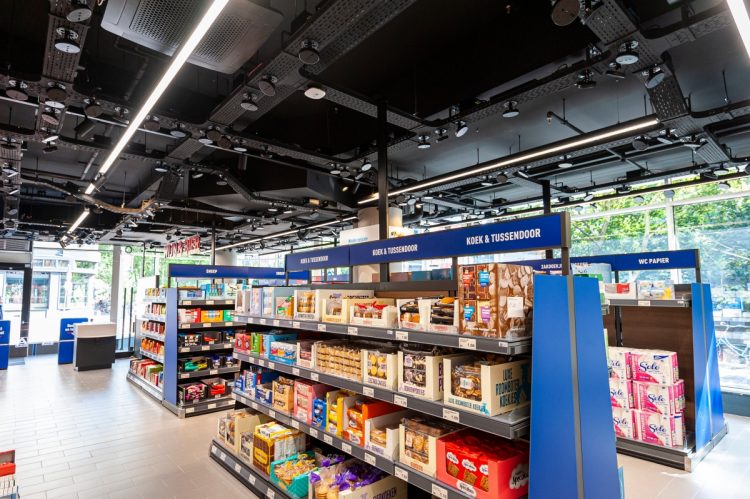Amazon has become the pacemaker in commerce, and today a startup that’s been building technology to help retailers keep up with it in the world of physical stores is announcing some funding to expand its business. Trigo, an Israeli startup that builds technology for stores to operate cashier-free, “just walk out” experiences similar to those you might find in Amazon Go stores, has raised $100 million.
Trigo focuses on grocery shopping, and it already has a high profile list of grocery retailers on its books, including Tesco, the UK-based supermarket giant; Germany’s REWE; ALDI Nord in The Netherlands; Netto in Munich; Shufersal in Israel; and the Wakefern cooperative in the U.S.. The plan will be to use the funding to expand its engagement with these, and to add more to the roster, amid a strong slate of competition in the market. Others in the same category include Standard Cognition (last year valued at over $1 billion), Shopic, Caper, Zippin, and Grabango, to name a few.
It will also be doubling down on expanding its technology. Alongside its autonomous check-out system based on hardware and software, Trigo also provides inventory management and will soon be launching “StoreOS” to bring these together with other tools (analytics, marketing and more) to help physical retailers link up their brick-and-mortar stores better with their online operations, and — thanks to the popularity of e-commerce — what customers are generally expecting out of any shopping experience these days.
Singapore’s Temasek and 83North are co-leading this round, with new backer SAP and previous backers Hetz Ventures, Red Dot Capital Partners, Vertex Ventures, Viola, and REWE also participating.
The startup is not disclosing valuation, but according to PitchBook its last valuation, in 2020, was in the region of $208 million. This latest round brings the total raised to almost $300 million.
Computer vision, machine learning and other innovations in artificial intelligence are being put to use in earnest in autonomous systems across a range of industries these days, and supermarkets have been one of the more interesting applications. Faced with an onslaught of offerings to buy groceries online and have them delivered to one’s home in ever-shorter turnaround times, retailers’ in-store experiences have largely remained in stasis.
In-store, however, also represents a large amount of inefficient overhead due to real estate and building costs, the rotation of products, theft and the cost of maintaining a staff to serve customers. The argument for bringing autonomous systems into the grocery store is not one of the technology for technology’s sake, but that it will help reduce costs and losses in all of these areas, while speeding up the experience for customers usually in a hurry to do something else.
Trigo’s self-check-out solution, called “EasyOut,” is based around a series of overhead cameras, shelf sensors and algorithms that work with “digital twins” of stores to operate cashier-free experiences.
Some believe that this is a costly approach, both in terms of initial installation and maintenance, arguing that other approaches, such as systems based on sensors that sit on shopping carts themselves, is the better approach.
“Smart counters and smart carts have their place, but full-store frictionless checkout based on AI-powered cameras and sensors — where the costs of the hardware are decreasing over time — is superior in both the experience it provides shoppers and for the efficiencies and tools it enables retailers,” CEO and co-founder Michael Gabay said in an email to TechCrunch. One of the issues is that carts don’t account for shoppers who are only buying a couple of hand-held items, he said. “Frictionless checkout makes shopping seamless for everyone, regardless of the size of their basket or how they plan to shop. If you have a full shopping cart you don’t want to wait at the cashier or scan all of those items at self checkout, you just want to walk out regardless of the size of your shop.”
He also believes that the “digital twin” approach that Trigo uses, which mirrors the store in real time, is more accurate and can be repurposed for more than just check-out, such as predictive inventory management. “Smart carts and similar technologies don’t allow for the full digitization of the store, so they are limited solutions when compared with the full system,” he said.
Gabay claimed that even in the current market climate — the bigger issue with stores and its shoppers is inflation and people worried about prices of goods, not how long it takes to buy them — has not really dampened conversations with customers. “Especially in periods of high inflation, rising prices, and supply chain disruptions, the value of managing the inventory and procurement is huge,” he said. The company does not disclose how much it costs to, say, equip an average supermarket with its technology, but it says that typically they get return on the investment within 18 months. “Tech-enabled cost savings accumulate over time and boost grocery retailers’ margins,” he said.
One argument for Trigo is that its tech can be used for all shopping, no matter the cart size, its focus right now, Gabay said, are large format supermarkets. To date, it has opened stores of between 3,000 square feet and 5,000 square feet — “on-the-go” type stores, Gabay said — but “we are now working on larger formats, including more than 10,000 square feet stores.”
While the grocery sector will remain the company’s focus precisely because of its specific inefficiencies, the longer-term plan is to expand to other categories of retail such as pharmacies and quick-service restaurants. “But we see huge potential to retrofit thousands of existing grocery stores worldwide,” Gabay said. “This is accelerating also as grocers increasingly connect their e-commerce shops to their physical stores.”
This is precisely where SAP is coming into the picture. It’s described as a strategic backer in this round: it works with its own long list of retailer customers, and the plan is to help integrate Trigo into those systems.
“Trigo’s superior computer vision technology built the infrastructure for grab-and-go shopping and laid the foundation for additional in-store scenarios of the future,” said Joern Keller, EVP and head of SAP S/4HANA, said in a statement. “As a leading provider of enterprise software for the retail industry, SAP is delighted to join as a strategic investor to Trigo to support the development of the StoreOS autonomous supermarket operating system. Their solutions will complement SAP’s cloud solutions for retail, integrating seamlessly with SAP S/4HANA and pave the way towards building an intelligent store.”
Source by techcrunch.com





























